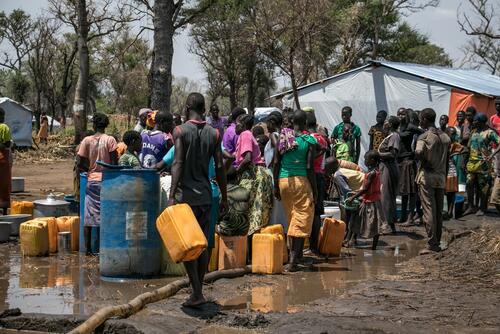
520M
52M
304,600
304,6
8,900
8,9

810
81
770
77
740
74
Providing assistance to South Sudanese refugees
Huge numbers of refugees from the southern belt of South Sudan (Greater Equatoria region) continued to arrive in Uganda in 2017. By August, one million people – 85 per cent of whom were women and children – had fled across the border into northern Uganda, according to UNHCR, the United Nations refugee agency. Despite the efforts of the Ugandan authorities and other organisations, the provision of aid was insufficient to meet the urgent needs of so many people.
MSF developed and adapted a wide range of activities to assist refugees. In Bidi Bidi, Imvepi, Palorinya and Rhino settlements in Yumbe district, teams conducted 273,773 primary healthcare consultations, admitted 3,574 patients to MSF-managed facilities, assisted 712 births, and offered mental health support and care for 786 victims of sexual violence.
In addition, staff provided vaccinations and ran health surveillance activities. The logistics team worked to improve access to drinking water, supplying an average of two million litres of water per day at the peak of activities.
Expanding access to HIV and TB care
An estimated 1.2 million people live with HIV in Uganda. Despite significant improvements, HIV detection and care remain a public health concern in specific groups of people, such as fishing communities, children and adolescents.
In landing sites for fishermen on lakes Edward and George, MSF opened a project in 2015 to improve access to HIV and TB testing and treatment.
MSF offers quick and reliable viral load monitoring through its point-of-care testing facility at Arua regional referral hospital, allowing patients to be switched to second-line antiretroviral (ARV) treatment if necessary.
By the end of 2017, 739 people were on second-line ARVs in Arua. In 2017, the team also provided drug-resistance tests and drugs which enabled 10 new patients to access third-line treatment. MSF reinforced clinical and psychosocial support for HIV patients in 2017, especially for adolescents, to help them adhere to their life-long treatment.

Sexual and reproductive care for adolescents
Adolescents are particularly vulnerable to the life-threatening health risks related to unwanted pregnancies, HIV/AIDS and sexually transmitted infections, due to a lack of awareness about these risks, and the shortage of youth-friendly sexual health and counselling services.
MSF opened the Kasese adolescent centre in Kasese town in 2015, which offers sexual and reproductive healthcare, as well as community awareness-raising and recreational activities that encourage adolescents to come for a consultation. In 2017, 30,852 adolescents had consultations and 20 victims of sexual violence received care.
Response to a Marburg fever outbreak
Between the end of October and the beginning of December, MSF responded to an outbreak of Marburg fever in Kween and Kapchorwa districts, in the east of Uganda. Teams set up two 10-bed treatment centres, trained healthcare staff and assisted local health authorities with epidemiological surveillance, community health promotion and mapping activities.


















